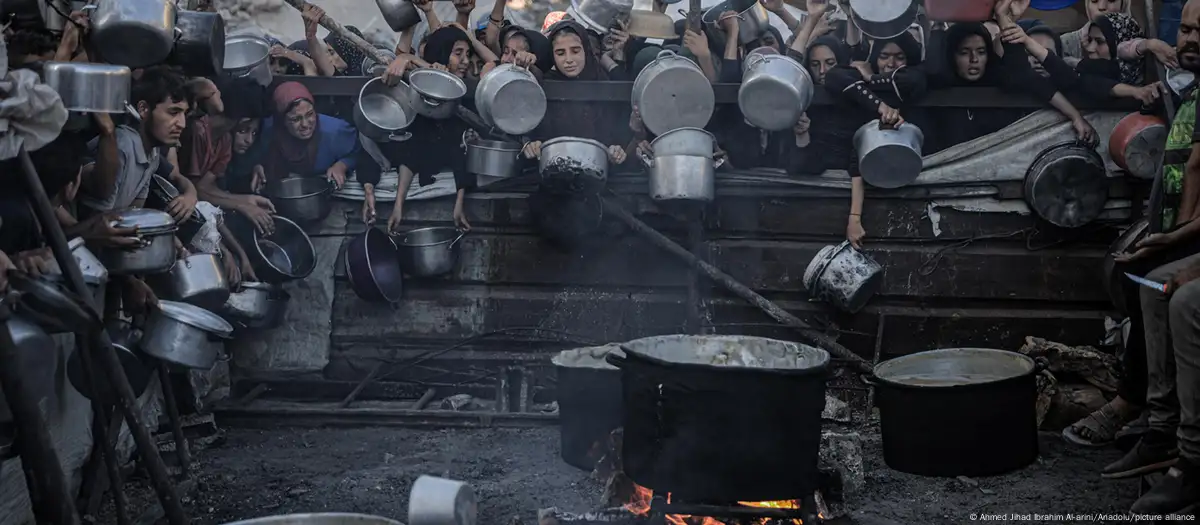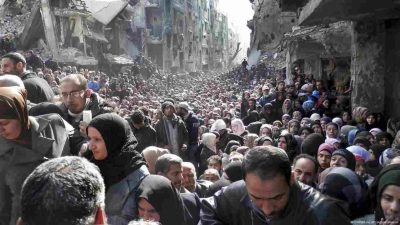
Intentional hunger has been increasingly used as a weapon. Situation in Gaza and Sudan drew attention to the suffering of civilians. However, there has never been a conviction in international courts on type of crime.
Apos at judging hunger as a war crime in many of the current conflicts are becoming more frequent and gaining strength. “Hunger is a weapon that is being used around the world at the moment. But that has to end, goes against international law,” said Shayna Lewis, a senior counselor for the American group Sudan Prevention and end of mass atrocities (Paema).
Lewis talked about the situation in the Sudanese city of El Fasher, with 30,000 inhabitants and has been besieged for a year, a situation that generated the shortage of food. “It’s an international crime and needs to be tried as such,” he said.
Human rights groups, such as Amnesty International and Human Rights Watch (HRW), made similar comments about Israeli block to the entry of aid and food in the Gaza Strip.
“Israel is killing Gaza de Hunger. It’s genocide. It’s a crime against humanity. It’s a war crime,” Michael Fakhri, a special rapporteur for the United Nations Food Rights, told the British newspaper The Guardian last week.
According to experts, the growing appeals to judge civil hunger as war crime occurs due to increased hunger caused by conflict. During the first decade of this century, there were few such situations, according to a World Peace Foundation report (WPF), but this has recently changed.
“This is an old phenomenon, which has been used for centuries in conflicts,” says Rebecca Bakos Blumenthal, legal advisor to the Hunger Responsibility Project, the Dutch Foundation Compliance of Human Rights (GRC). According to the expert, this tactic resurfaced after 2015.
Hunger as a weapon of war
In the last decade, hunger has been recorded in conflicts in Nigeria, Somalia, South Sudan, Sudan, Syria and Yemen. Food security experts evaluate that Russian attacks on Ukrainian agriculture can also be seen as criminal attempts to turn food into arms. They also argue that there was an increase of this type of war crime.
“Even with the improvement of global food security, hunger incidents are increasing,” says Alex de Waal, professor at Tufts University, and Mass Hunger Research Director at WPF. “This shows that global food security is more volatile and unequal. This is consistent with the use of hunger as a weapon.”
Beef, the Sudanese city of El Fasher, with 30,000 inhabitants, also faces foods | UNICEF/XINHUA/PICTURE ALLIANCE
The deliberate retention of food and essential civilian survival items is considered a war crime by many countries and also in various iterations of international law, such as the Geneva Convention, which established rules for International Humanitarian Law, and Rome Statute, applied by the International Criminal Court (ICC).
Despite this classification, so far, no one who has used this tactic in a conflict has been brought to trial. The crime of hunger war was never tried in an international court alone, only as one of the accusation part of about 20 other cases of war crime.
The fact that civilians starve in a conflict does not automatically mean that a crime was committed. “One of the legal issues is the intention. The crime of hunger war needs the perpetrator to act as the intention of this,” says of Wal.
Hunger occurs in the long run, punctuates Waal, and some jurists argue that it is necessary to prove that the perpetrator had from the beginning, for example, of a block or siege the intention to kill civil hunger. Most experts, however, defend an “indirect intention,” he explains. That is, of course this situation will occur “in the normal course of events”, and the perpetrator knows this, having opportunities to prevent civilians from starving, but did not.
Another issue for cases involving hunger is the lack of precedents, as well as the definition of which national and international courts would have jurisdiction about the alleged crimes of war.
Perspective Change
Until a few years ago, hunger was seen as a matter of development or humanitarian, said Blumenthal of GRC. But now more attention is being paid to the criminal aspects. “I work on this issue a few years ago and these things go slowly,” says Blumenthal, who has been dedicated to the theme since 2020. “I believe, however, that the situation is changing and that some relevant measures have been taken over the past ten years.”
In 2018, the UN Security Council approved a resolution that condemned the hunger of civilians as a method of war. In 2019, changes were made in the Rome Statute, making hunger a war crime also in local armed conflicts rather than only international.
There were UN surveys on conflicts in South Sudan and the Tigré region of Ethiopia, focusing specifically on the issue of hunger as a war crime, adds Blumenthal.
“We are seeing more international and local organizations, along with liability mechanisms, denouncing this and certain remarkable examples, such as Gaza today, expanded the awareness of this crime,” says the expert.
 Assad paid cities in Syria, causing food shortages | Unrwa via AP/Picture Alliance
Assad paid cities in Syria, causing food shortages | Unrwa via AP/Picture Alliance
Blumenthal points out that TPI arrest warrants against Prime Minister Benjamin Netanyahu and former Israeli Defense Minister Yoav Gallant in November 2024 are a “historical milestone” for specifically mentioning hunger as a war crime. It was the first time warrants highlight hunger as an isolated crime. She adds that the court also has an open investigation into Sudan.
“The question has undoubtedly gained attention in the last ten years. All legal structures are in force. What is missing is a political will to act,” says Wal.
Convicted criminals?
From Waal points out that there is still jurisdictional challenges, but he is confident that in many cases there can be convictions. “Just take the accused to the court.”
Blumenthal agrees. “There are misconceptions about this and many think hunger is an inevitable part of war. But during our in -depth investigations, it is surprising that it is clear that, in fact, these patterns are very sharp and in many situations it is possible to discern a deliberate strategy.”
Cautiously, Blumenthal is optimistic that those who have used the hunger of civilians deliberately as a weapon of war will soon face the court. “This is certainly hope. That’s what we’re working for.”
Originally published by DW on 08/18/2025
Por Cathrin Schaer
Source: https://www.ocafezinho.com/2025/08/19/fome-um-crime-de-guerra-que-permanece-impune/

